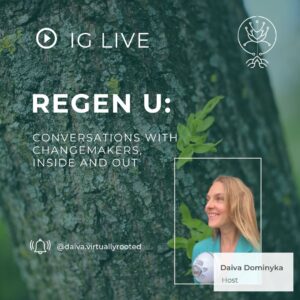🌳 Regen U: Meet Florijn de Graaf, Founder of Smarthoods – Creating Regenerative Neighbourhoods of the Future
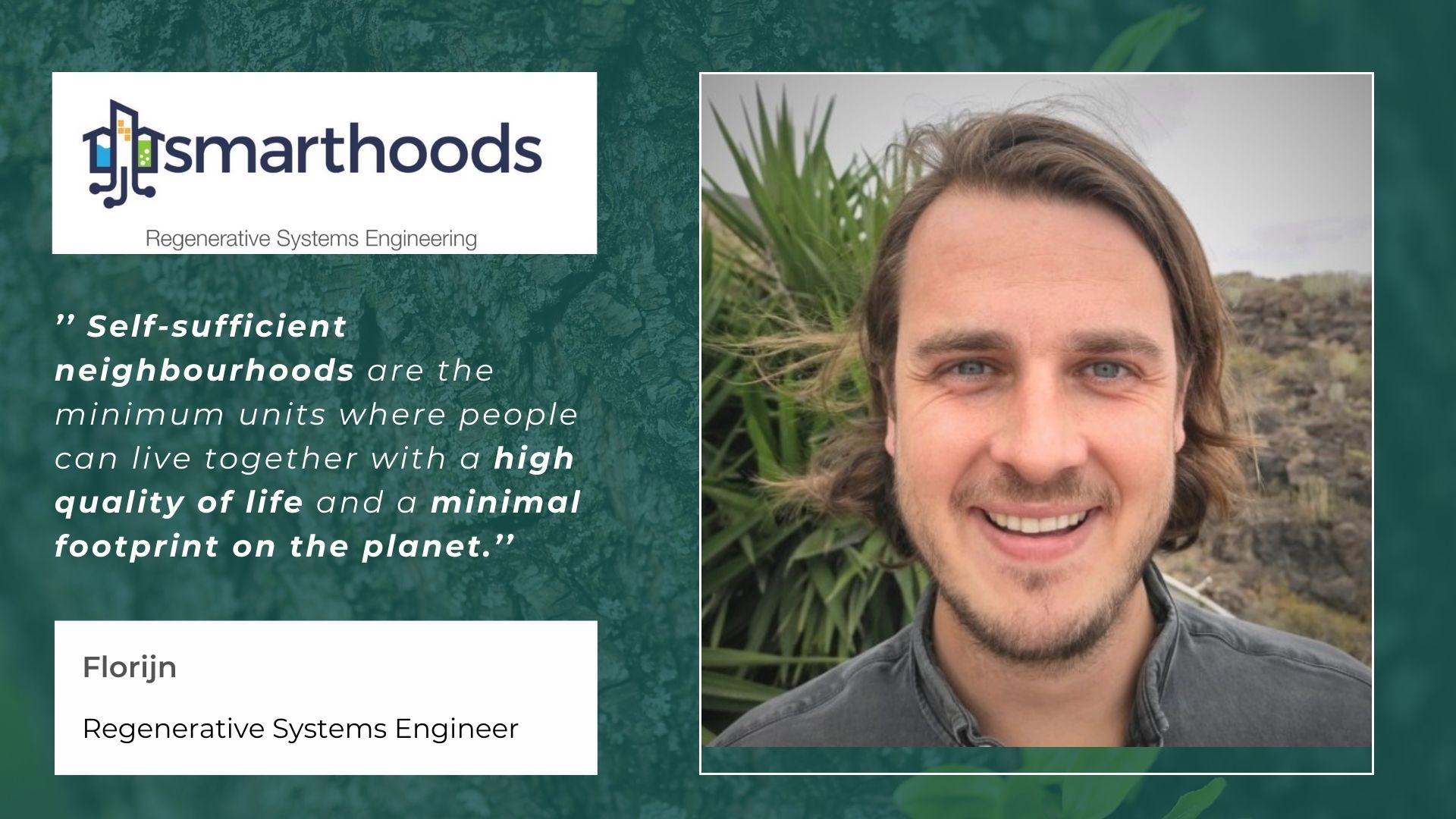
Welcome to Regen U: Conversations with changemakers, inside and out. A monthly live interview series with impact-driven entrepreneurs that champion climate action and ecological regeneration and recognise the imperative for individual and collective healing.
This month, my guest is Florijn de Graaf – a regenerative systems engineer and founder of Smarthoods. A company on a mission to create self-sufficient neighbourhoods of the future.
🎙 Listen to a live conversation here.
Where did your journey begin towards regenerative systems engineering?
10 years ago, I helped to build my father’s eco-village in the Netherlands, a beautiful earthship village made from earthship-type houses made from locally sourced renewable or recycled materials.
It really inspired me because now that it’s finished, it’s just such a wholesome neighbourhood to walk around. It showed me that it’s possible to live sustainably in a comfortable way. And also in a way that is in balance with both the people around you and the planet at large.
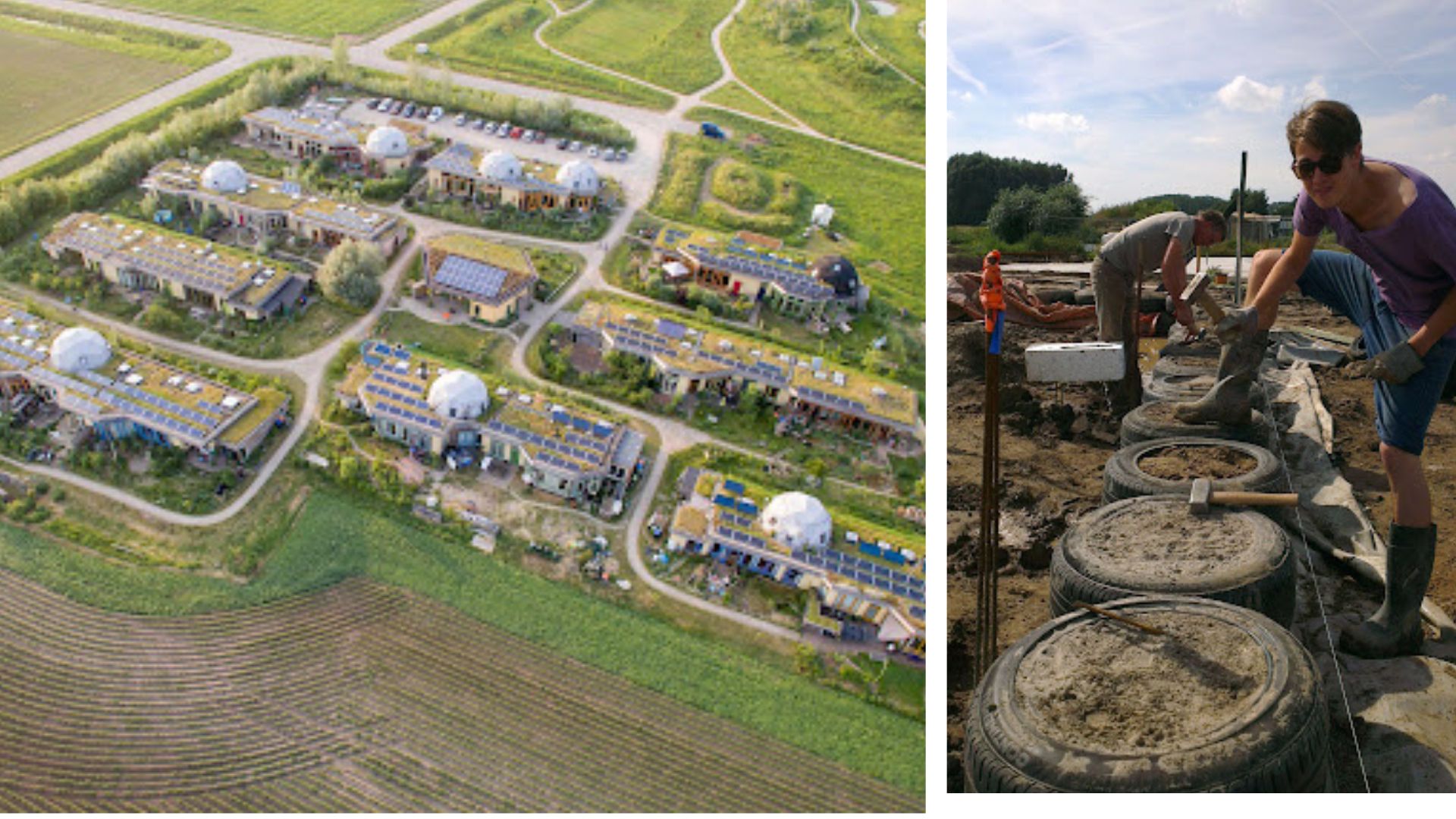
So, do you believe we are capable of living sustainably without losing comfort?
No, actually not. I’m probably your worst pessimist. We do have to sacrifice a lot of modern-day comforts in order to get there.
What does regeneration mean to you? Is it just another buzzword?
Regeneration to me means living in such a way that it’s beneficial to your surroundings – leaving the world a better place than it is.
And in practice, it’s being very aware of the impact of yourself, the system you are in, on its surroundings. And then, from that awareness, taking the right action. So it’s also very much a verb that starts with awareness.
Often, people working in a climate space have a story or a critical point in their lives when something happened where their climate awareness shifted. Did you have that moment in your life, or was it a gradual process?
Yeah, I do, I have a moment where it really hit me.
Since high school, I’ve been aware of sustainability and climate change, but when I did my master’s degree in Sustainable energy engineering, there was this course ‘’Sustainable energy futures’’.
And every week, we would discuss a new topic regarding energy transition. One week, it would be solar panels, the next week, batteries, electric vehicles, hydrogen, biomass, nuclear power, you name it. And you just got the general numbers of what is possible, where we are now, and what needs to happen – just the numbers, and I’m a numbers guy…
So, I started to learn about our world’s energy demand and what it takes to step away from that. And then you start making the calculations, and then you realise, oh my God, we’re really deeply addicted to fossil fuels.
And the only way to stop it is, like with any addiction, you can either go cold turkey or gradually. The gradual way is not fast enough to save the planet, and the cold turkey way, like with severe addiction, could potentially kill the addict.
It’s unfortunately very clear that we cannot sustain our current energy consumption levels. And therefore also wealth, because energy and wealth are inextricably linked. And energy is also inextricably linked to quality of life.
So yeah, it’s a very complex problem with no easy solution. And there are no silver bullets. I’m not optimistic.
I believe that every job is a climate job, and you proved that.
You took quite a standard profession like engineering and re-invented it for the better by creating a new concept of Regenerative systems engineering. Can you explain to us what is it exactly?
I came up with it a half year ago. And before that, I didn’t like the word regenerative at all. It’s just the next word in a line of words that are used for greenwashing for sustainability, now regeneration.
And the truth is we’re not even to whatever comes before sustainability, most of the time. And I decided to jump on the regenerative bandwagon because of its ethos. It is ultimately what we with Smarthoods would strive towards. And in that sense, I agree with people who have adopted this language. We do strive for regeneration.
However, it’s also very important to be critical of yourself and real. Are you really regenerating, or are you simply adopting the language? And so right now, with Smarthoods, the goals must be regenerative as far as possible.
And what would that look like?
The goal is to create neighbourhoods that supply their own energy, food and water locally, which means that if you live in a neighbourhood that can be classified as a Smarthood. You will have a roof over your head, you have water from the tap, you have energy from the plug, food on your plate, and heating. So, the whole bottom of your Maslow pyramid of needs is catered to and supplied. And then you also live with people in the neighbourhoods that provide you with a sense of community, safety, and friendships.
Most of the human needs can be satisfied in a place like this. And for me, it’s very clear that self-sufficient neighbourhoods are the minimum unit where people can live together with a high quality of life and a minimal footprint on the planet.
We believe that, and we can substantiate this with numbers. Living in a Smarthood will instantly reduce your CO2 footprint by 40%. And to put that in perspective, if you drive an electric car, it only reduces your CO2 emissions by 5%. Same thing for becoming a vegetarian, it’s also 5%. So, the vision of living in these regenerative neighbourhoods will have a huge impact when they find mainstream adoptiAnd in that sense, it will be regenerative.
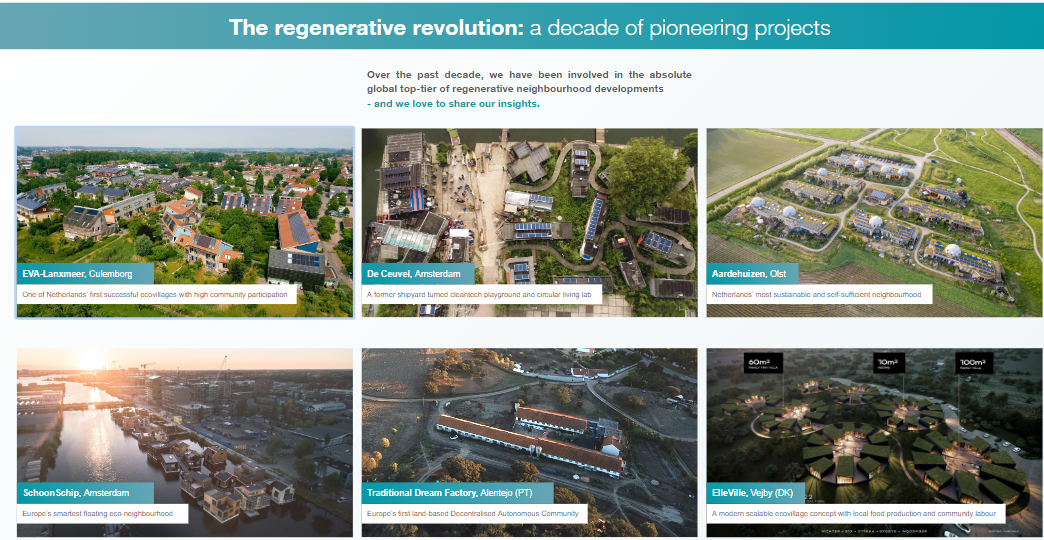
Apart from CO2, could this concept of regenerative neighbourhoods be a solution to housing crises? Would this increase the affordability of owning or renting a living space?
The housing crisis is tricky because living in a neighbourhood like a Smarthood ultimately requires a low density of people per square meter. Cities are important to achieve the density of population required to house everyone. So, I’m not sure if it will be a good solution for the housing crisis, but I think it can be a good solution for transforming how we live.
So, one thing I’ve experienced firsthand while living in a community here in Portugal, called Traditional Dream Factory is that life here is very simple. It’s an old chicken farm, we produce our own food, and the bus goes two times a day and it’s close to a town where life has almost gone through a standstill.
It’s a very simple, low-impact life; you’re just there with people growing your food, repairing things, and making things from waste, and people there are actually happy. It’s a very healthy social community.
There is this feeling of being embedded in a group of people. It is so nourishing and it’s something that’s so lacking most of the time in, let’s say, in a big city life with a more competitive and compartmentalised lifestyle.
While being at TDF and experiencing this slow life and having the time to talk to people again, and I mean, it sounds all very hippy-lovey-dovey, which it is, in a way, but it does feel very nourishing, nurturing, and also, you’re really living a life together in such a way that you both, have to do the dishes, and you both have to do all the dirty work, and you see the real version of someone. I cannot imagine that people who are well-embedded in a more communal lifestyle would have the need to go and buy an expensive Ferrari to show off.
Because basic human needs of nurture, nourishment, connection and expression are satisfied, right?
Yes, society feels just like the monkey rock, as we would say in Dutch, is so big, and everyone’s trying to climb it, and that’s part of the system design that we have, which causes us to act that way, to be in an overdrive state.
Our societies are very competent and well-structured, and we put a man on the moon, and we built iPhones, that’s amazing, but it’s part of the problem – we lost touch.
Bringing back to Smarthoods.You have built various systems: solar carport, helophyte filter, aquaponics system, strawbale house, to name a few. What was your favourite project so far?
Helophyte at TDF – we built together with volunteers there last fall. It’s low-tech, has three pools in succession that filter the water coming from the kitchen and the showers, and they break down the bacteria and organic compounds in the water, and then it’s pumped up back for irrigation.
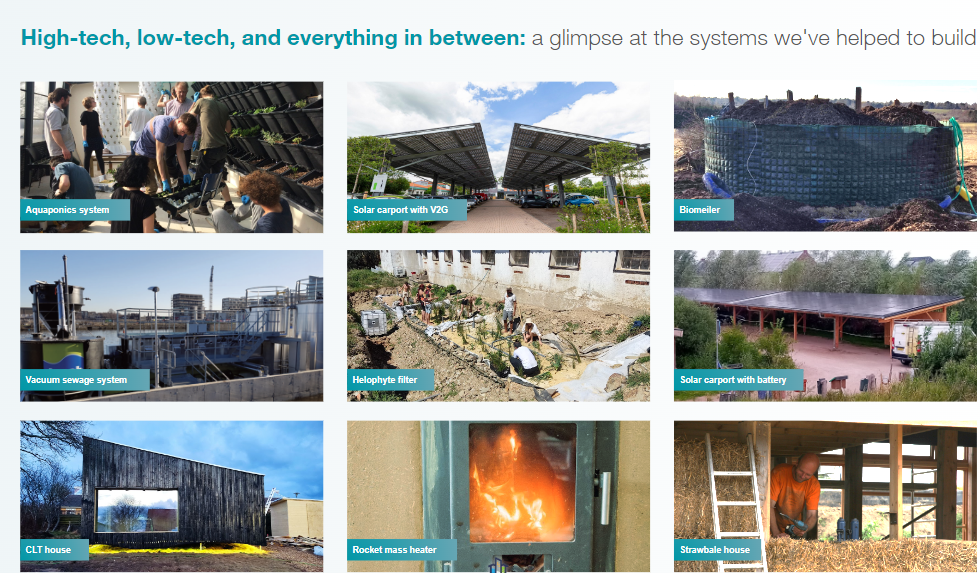
It’s very simple, and it can easily be replicated – we built it in Alantejo in Portugal, which is a very drought-dry, but also is very dry drought-prone area AND in the coming decades, it’s going to become like Morocco there.
The groundwater table is dropping fast, and farms are no longer allowed to pump up water anymore, so this type of solution, where instead of flushing your water down the sewage, you keep it on the land and use it to irrigate your plants afterwards, is beautiful.
It’s a very valuable tool in the fight against the upcoming drought, and it’s low-tech, so there’s no reason why farmers everywhere wouldn’t be able to build this.
What was the driving point behind starting your own business?
I think it’s a combination of stubbornness and privilege and seeing how things can be different, and realising I’ll have to do it myself.
I realised when working normal hours, if you worked hard or worked very smart and finished fast, like, here you go, there’s more work, and it’s like: What? No! I need to feel properly rewarded for putting in bouts of hard work to feel accomplished and satisfied taking time off afterwards. Entrepreneurship has that high-risk, high-reward direct payoff that suits my workstyle.
What message would you like to share tonight?
Take more risks and explore more. It’s the key to living a fulfilling life.
Thank you so much, Florijin, for your time and energy and if you would like to support Smarthood’s growth, they have recently announced THE AMBASSADOR PROGRAM!
REGEN U: CONVERSATIONS WITH CHANGEMAKERS, INSIDE AND OUT
Stay in the loop to meet more regenerators
Monthly live interview series and newsletters with businesses in regen space



